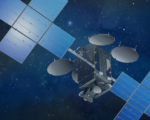INTRODUCTION:
European aerospace giants Airbus, Thales, and Leonardo are reportedly in discussions to establish a joint satellite venture, codenamed “Project Bromo.” This ambitious initiative aims to challenge Elon Musk’s Starlink network and reshape Europe’s satellite sector, which has struggled with losses and competitive pressures from low-cost satellites in low Earth orbit (LEO).
KEY DETAILS
- Project Bromo – A European Satellite Champion:
- The venture, modeled on missile maker MBDA, envisions a standalone entity combining satellite assets rather than a traditional acquisition structure.
- This collaborative effort seeks to leverage the strengths of the three companies to create a scalable and competitive European satellite enterprise.
- Leonardo CEO Roberto Cingolani confirmed discussions about adopting the MBDA model but noted governance structures may vary.
- Strategic Drivers:
- Europe’s leading satellite makers, traditionally focused on high-complexity geostationary orbit spacecraft, are adapting to the rapid rise of smaller, cost-efficient satellites in LEO.
- Cingolani emphasized that satellites could account for 75% of the space economy in the future, highlighting the need for Europe to stay competitive in this evolving market.
- Job Cuts Across the Industry:
- Parallel to the satellite initiative, Airbus plans to cut up to 2,500 jobs in its Defence and Space division, representing 7% of its workforce, by mid-2026.
- Thales has announced plans to reduce 1,300 space-related positions as part of restructuring efforts.
- Most Airbus cuts are expected in its €2 billion space systems business, with reductions likely in France, Germany, the UK, and Spain.
- Historical Challenges:
- The European space industry has long discussed restructuring but has faced delays due to competition concerns and governance complexities.
- Despite previous attempts, including Airbus’ 2001 pledge to restructure the space industry after forming MBDA, substantial progress has been elusive.
- Timeline and Implications:
- Project Bromo is still in early stages and could take years to materialize.
- If successful, the joint venture would provide Europe with a robust satellite manufacturing entity capable of competing with global players like Starlink.
MARKET AND COMPETITION
- Global Satellite Trends: The space economy is shifting toward LEO satellites, driven by demand for affordable, scalable solutions for global internet connectivity and communication.
- Challenges from Starlink: SpaceX’s Starlink dominates the LEO market with its extensive satellite network, presenting a formidable challenge to European firms.
- European Collaboration: The MBDA-inspired model may allow for better resource pooling and coordinated competition, reducing fragmentation in the European satellite market.
CONCLUSION
Project Bromo represents a significant step toward strengthening Europe’s position in the satellite industry. However, its success depends on overcoming technical and governance hurdles and aligning the diverse interests of Airbus, Thales, and Leonardo. Simultaneously, widespread job cuts underscore the challenges facing the European space sector as it navigates competitive pressures and structural realignments.
















